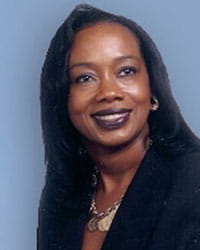How Dr. Victoria D. Coleman personalizes counseling for her clients and students

Visiting a brothel can be an educational experience and Dr. Victoria D. Coleman doesn’t pass up an opportunity to leave a lasting impression on her students. She took a class to visit a Southern Nevada brothel to break down their dogmatic views of prostitution that were based on myths and stereotypes. She succeeded—and challenged her own views on the sex industry, sex crimes, and domestic violence in the process.
Coleman, a faculty member in the School of Social Work and Human Services, is the founder, president, and CEO of both The Coleman Group and The Anger Doctor, management consulting firms that specialize in anger management, human capital, training, and research. She also serves as a Substance Abuse Professional for the U.S. Department of Transportation and as a certified federal mediator for the U.S. Equal Employment Opportunity Commission and the U.S. Department of Homeland Security. Here, she discusses her teaching methods and their real-world applications.
How is your work interconnected?
It’s unified by the Tennessee Self-Concept Scale, which divides us into physical, moral, personal, family, social, and academic/work selves. I use this to help clients understand their strengths and limitations. Almost all of my clients come to me lacking in one of these areas, which impacts their abilities to function at their best. Over the years, I’ve refined this tool to help people overcome anger issues or the mental health implications of substance abuse.
How have you personalized counseling?
I published Lifeline in 1998. It is a therapeutic technique in which you draw lines and shapes or write narratives that illustrate themes, trends, patterns, and milestones. This information is then used to establish short- and long-term goals to determine next steps in the therapeutic process with your counselor based on the outcomes you would like to see. This has been used in human-capital training for businesses as well as in individual mental health counseling.
How do you make classroom discussions more tangible?
I developed WHAT! (What Happened After That!), a series of topics I post for my students that refer to an event in popular media or an ethical, moral, or legal dilemma I’ve encountered professionally. Then I ask students to address the situation. Theories can be sterile in that some students are unable to understand the application to real-world counseling environments. The discussions these posts create enliven the online classroom. This type of engagement helps students bridge the gap between theory and application by giving them a real-world situation, as in how to counsel one of the women in that brothel, or her family.
What do students learn from your background?
Because I’ve worked in such diverse practice areas, the students really understand the myriad opportunities they have with a background in counseling, human services, and psychology. Students value and appreciate the ways their skills can be transferred to a variety of practice environments.



